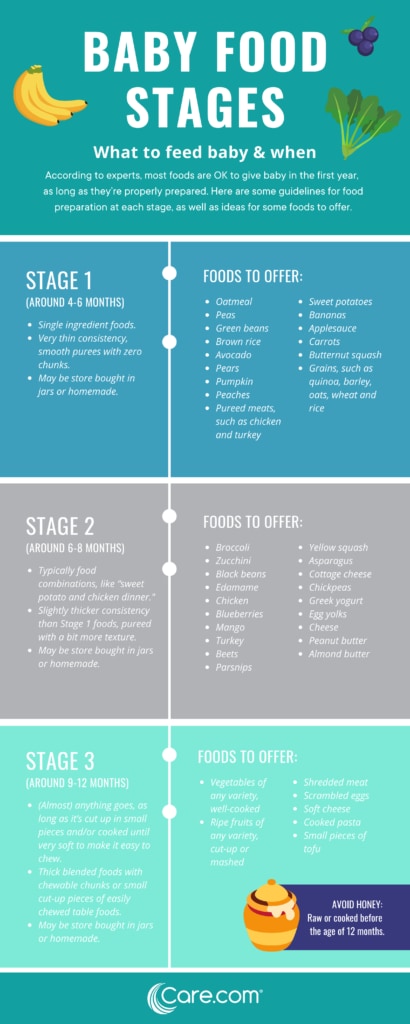
When to Start Baby Food: A Comprehensive Guide for Parents
Introduction
Introducing solid foods to your baby is an exciting milestone that marks the transition from exclusive breastfeeding or formula feeding to a more diverse diet. However, determining the optimal time to start this transition can be a source of confusion and uncertainty for many parents. This comprehensive guide will provide you with evidence-based information and practical advice to help you make an informed decision about when to start baby food.
Recommended Age for Starting Baby Food
According to the American Academy of Pediatrics (AAP), the recommended age to start introducing solid foods to babies is around 4 to 6 months of age. This timeframe is based on several factors, including:
- Developmental readiness: By 4-6 months, most babies have developed the necessary oral motor skills to safely handle and swallow solid foods. They can sit up with support, have good head and neck control, and can coordinate sucking and swallowing.
- Nutritional needs: Breast milk or formula alone may no longer be sufficient to meet the growing nutritional needs of babies as they reach 4-6 months of age. Solid foods can provide additional nutrients, such as iron, zinc, and fiber.
- Iron deficiency prevention: Iron is an essential nutrient for babies, and it is not present in significant amounts in breast milk or formula. Introducing iron-fortified cereals or other iron-rich foods around 4-6 months of age can help prevent iron deficiency anemia.
Signs of Readiness for Baby Food
In addition to the recommended age, there are certain signs that may indicate your baby is ready for solid foods:
- Shows interest in food: Your baby may reach for your food or try to put objects in their mouth.
- Can sit up with support: This indicates that they have good head and neck control, which is necessary for safe swallowing.
- Has lost the tongue-thrust reflex: This reflex causes babies to push food out of their mouths with their tongues. Its absence indicates that they are able to control their tongue and swallow food.
- Has good coordination: Your baby should be able to coordinate sucking and swallowing, which is essential for eating solid foods.
Foods to Start With
When starting baby food, it is recommended to introduce one new food at a time, waiting 3-5 days before introducing another. This allows you to monitor your baby for any allergic reactions or digestive issues. Some good first foods to try include:
- Iron-fortified rice cereal: This is a good source of iron and is easy for babies to digest.
- Pureed fruits: Start with mild-flavored fruits like bananas, applesauce, or pears.
- Pureed vegetables: Try vegetables like sweet potatoes, carrots, or peas.
- Yogurt: Choose plain, unsweetened yogurt that is full-fat.
How to Introduce Baby Food
Start by offering a small amount of pureed food on a spoon. Let your baby explore the food with their tongue and lips before swallowing. Gradually increase the amount of food as your baby becomes more comfortable.
Frequency and Amount
Once your baby has tolerated a few different foods, you can start offering them solid foods twice a day, once in the morning and once in the evening. The amount of food you offer will vary depending on your baby’s appetite and individual needs.
Signs of Food Allergies or Intolerances
It is important to be aware of the signs of food allergies or intolerances in babies. These may include:
- Skin reactions: Rashes, hives, or eczema
- Digestive issues: Vomiting, diarrhea, or constipation
- Respiratory problems: Wheezing, coughing, or difficulty breathing
- Anaphylaxis: A severe allergic reaction that can be life-threatening
If you suspect your baby may have a food allergy or intolerance, stop feeding them the suspected food and consult with your healthcare provider immediately.
Transitioning to Table Foods
As your baby grows and develops, you can gradually transition them from pureed foods to table foods. This typically starts around 8-10 months of age. Table foods should be cut into small, bite-sized pieces and should be soft enough for your baby to chew and swallow safely.
Tips for Successful Baby Food Introduction
- Be patient: It may take several tries before your baby accepts a new food.
- Offer a variety of foods: This will help your baby develop a healthy palate and ensure they are getting a wide range of nutrients.
- Avoid added sugar and salt: These are not necessary for babies and can be harmful to their health.
- Make mealtimes enjoyable: Create a positive and relaxed atmosphere for your baby during mealtimes.
- Follow your baby’s cues: Pay attention to your baby’s hunger and fullness cues. Do not force them to eat if they are not interested.
Conclusion
Starting baby food is an important milestone in your child’s development. By following the recommended guidelines and paying attention to your baby’s individual cues, you can ensure a smooth and successful transition to solid foods. Remember to consult with your healthcare provider if you have any concerns or questions about your baby’s feeding.
